
Featured Blog | This community-written post highlights the best of what the game industry has to offer. Read more like it on the Game Developer Blogs.
How did I end up making a game about such a controversial and complex topic like suicide? Is it really that difficult? What is the connection between collecting bottles and my game? What mistakes did I make while developing and what was done right?

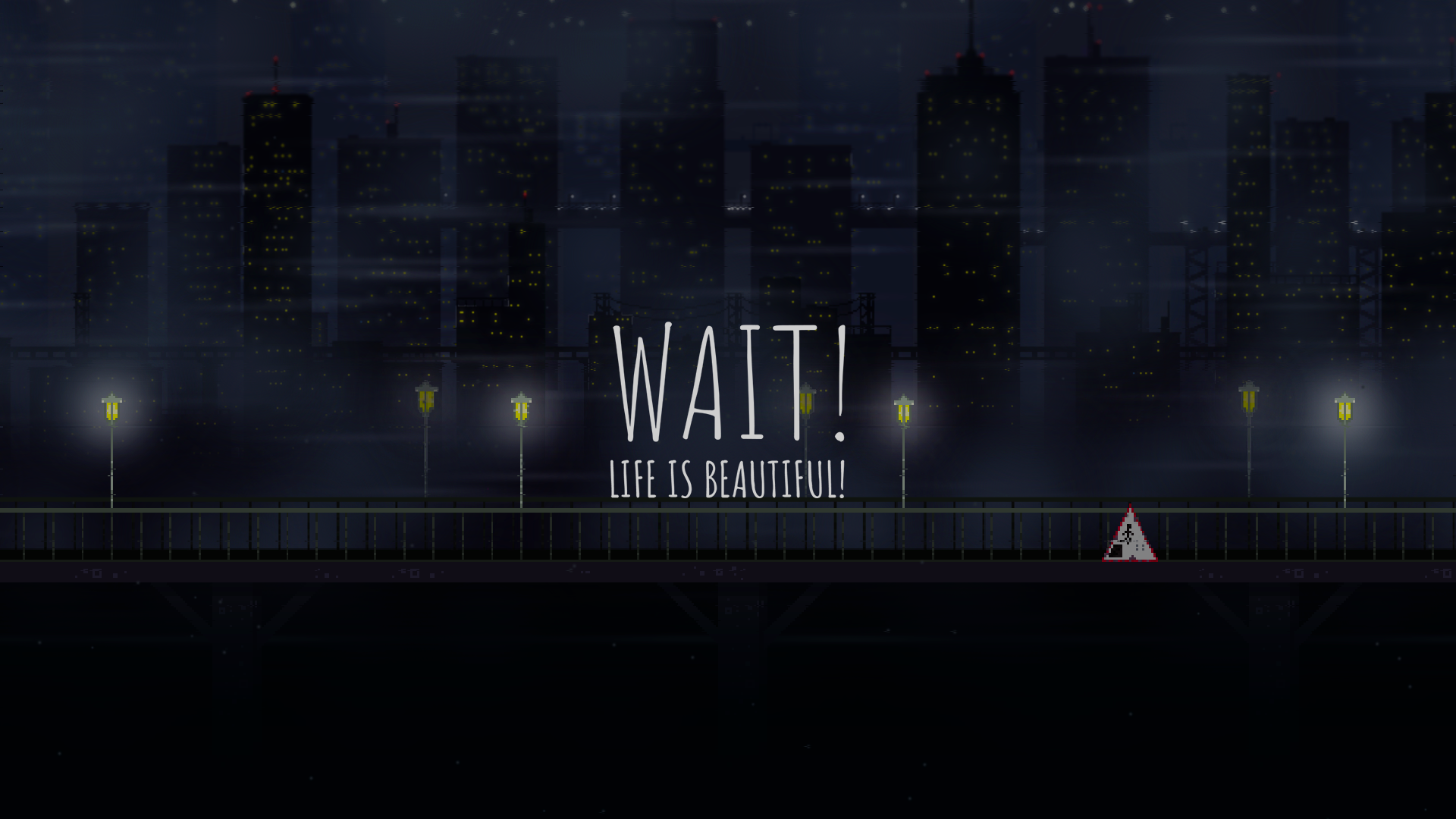
Note: This article came to be as part of an interview/chat with the Wait! Life is Beautiful solo developer, 'Egor Perviy' the majority of the words are his (though originally in Russian). It was then typed up into this form with his approval. As such, please read this article as if it were coming directly out of his mouth.
Since this article will cover some sensitive topics, I want to give you a trigger warning/notice. Though you will not find any shocking content here, this game is about suicide (but in a way that we hope will help people understand it, notice the signs from their friends and loved ones, and to break the taboo of talking about this subject.
Before you read on, do check out the animated trailer for Wait! Life is Beautiful! as it puts into perspective the story and themes of the game far better than words can describe, and will also give you a good idea of what to expect from this article.
With that nicely laid out, let's dive into the heart and soul of the developer and see what he has to say.
How I ended up in “suicidal” Gamedev
We were at a bookstore with my mother and on that day we were there to buy school supplies. The weather was hot, I wanted to go home, my mother was on edge, tired after a long working day, and I simply followed her around. The study books were so hideously colorful (who makes kids' books look so sleazy?). The shelves arranged in endless rows that were almost shapeless. We went around in circles while “elevator music” played from the speakers.
I think it was that sort of melody that could be playing in an elevator. But don’t ask me how I know it – in my elevator, there is no music. And sometimes there is no light.
When I almost started to decay into mold I could only think about going home, then I saw THE BOOK! I took it in my hands and looked into its soul, it was big, heavy, white, and had a toy car on the front cover. Black letters radiate with magical glow: “How to make a 3D game”. I had been dreaming my whole life about this particular book and at that moment my mental decay stopped. The air became clear and the world gelled, my heartbeat was so loud that I could feel it pulsating in my head muffling the elevator music. I could hardly breathe, but I got a grip and showed the book to my mother explaining that I’d found my dream. My reason to live. My way. Mom looked at the book, then at me, then at the price tag, again at me. Her voice was tired: “No.” We took the notebooks and left.
As you can understand from this small digression, I thought about making games 15 years ago. During these 15 years, I did nothing even slightly connected to game dev, due to various reasons.
Then 2016 happened and I made my first step: I downloaded Unity. I drew pixel art for the first time in my life and I had my first experience of clicking somewhere just to make stuff suddenly disappear forever. I ended up watching hours and hours of video guides.
...After creating several things that will never be published and gaining some experience (or it’s better to say, getting an idea of what game design, storytelling, and programming is), I started my search for inspiration to find the theme of 'The Game'.
Gamejam “7 deadly sins”
While surfing the Internet and reading through numerous game dev forums, I stumbled upon a tiny hackathon that had a catchy topic and thought: this is it! (the “it”). So I worked on the idea of a game about suicide when I saw the title. Well, technically, killing yourself isn’t on the list of deadly sins, but in religious teachings, it guarantees that you would go straight to hell, doesn’t it? So there you go: suicide equals deadly sin, right? Well actually, no. My over-broad interpretation invoked the wrath of one of the event judges. Though wrath is a deadly sin, so I had that going for me!
Short indie film “Lime-blossom tea”
The best fuel for your own creativity is someone else’s art, but don't get me wrong, I do not mean stealing. So, I went to a local short film festival in Saint Petersburg and was deeply impressed. I personally think that it is a tragic loss that the event will never happen again due to some laws that prohibited it. However, it doesn’t stop me from sharing with you the short film that I’ve taken my concept from, check it out here.
Life is Strange
During that time I was also playing this game (Life is Strange) and after mastering my skill of searching through garbage (in-game), I stole an interesting idea from LiS. At some point in the game, a girl wants to jump from a roof, the main hero tries to talk her out of it while having no possibility to rewind time and safely pick proper words. It’s the only scene in the game when you can’t just rewind to choose the right option. You say something wrong – the girl dies.
Personal motives
This point is intentionally the last because I don’t like to talk about it. But you’ve probably already guessed that no one thinks about these themes just for fun. Unfortunately, depression and a suicidal tendency was a part of my life. I had a close friend who took his own life, I too live with depression and have to admit to several suicide attempts.
But it was these things that helped shape my direction, as I thought: why not put the thoughts of self-destruction to good use and create something meaningful out of it?
So when I got the subject, I had a strong desire to do something that would make people talk. There is almost no discussion on this topic in our society which is insane as suicide as a phenomenon is tightly intertwined in our lives. From Anna Karenina from the compulsory literature course at school (Yesenin and Mayakovsky are also here) to a huge number of mass culture figures, news of those suicides already seems to have become the norm. Not to mention the culture of generation Z, which is literally based on depressive humor, nihilism, and the unwillingness to live.
So I’ve got a theme and felt an aching need to make something that people would speak about.
To put it short, it hooked me, I felt a burning desire. I knew in advance that it would not be a masterpiece, but even in the worst-case scenario, I could definitely do something really meaningful, and socially significant, if I may.
The first prototype and a couple of tips
To think everything through is almost impossible. The ideas that you have in your mind are surely awesome and adequate, but as soon as you start working on implementing them, you’ll start seeing plenty of technical limits and inconsistencies. Allow me to reiterate this wisdom for the thousandth time for you: prototype! Add in your core mechanics and features, the earlier – the better.
In 2 weeks, I had a barely working prototype with 1.5 suicides and a bunch of grammatical errors in the texts. It was nice that one of the judges mentioned I had an interesting concept. However, others couldn’t launch the game at all, and some even condemned me for incorrectly choosing the topic. Overall, the experience was positive, the gameplay seemed solid, and I, of course, liked it.
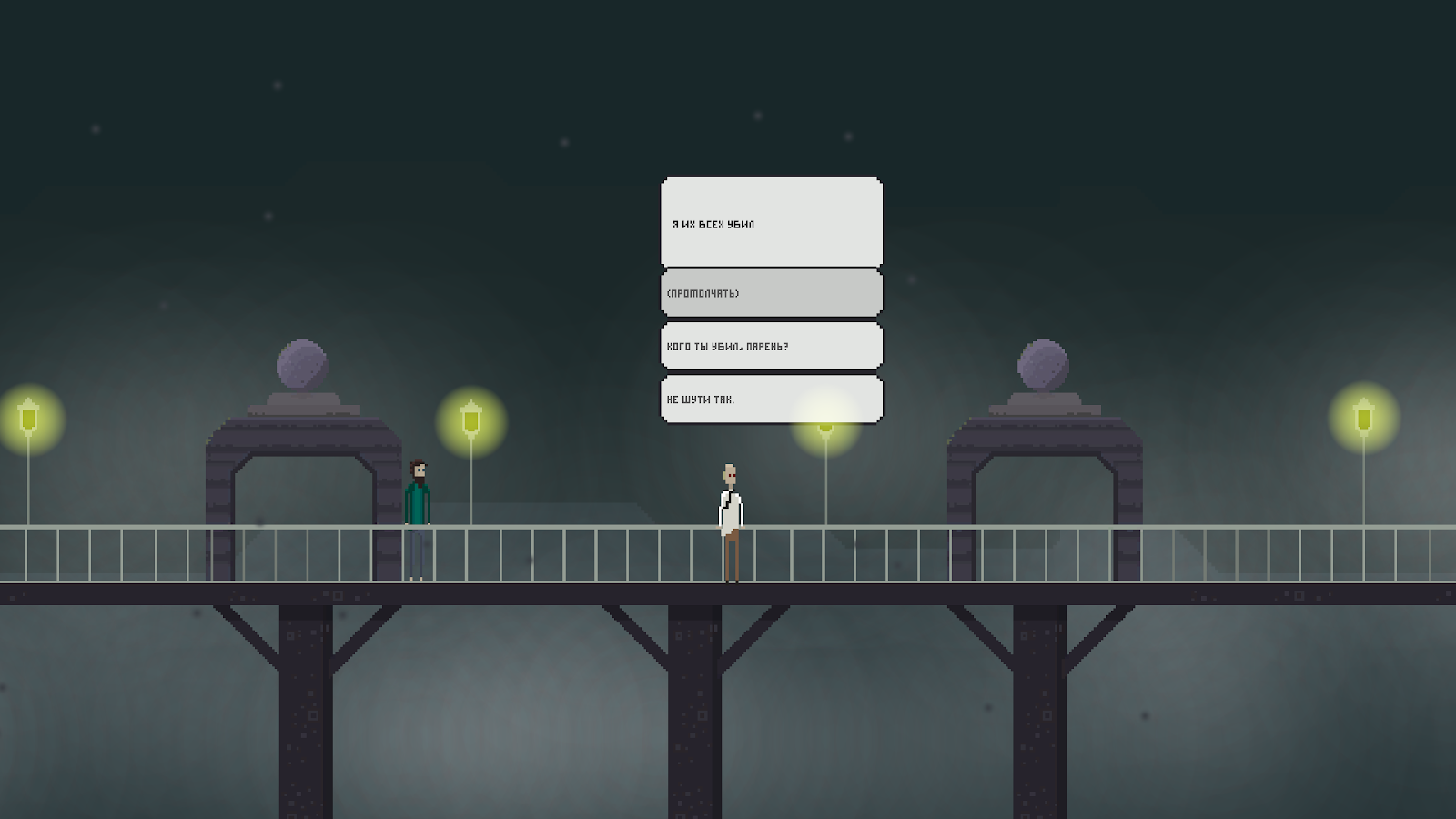
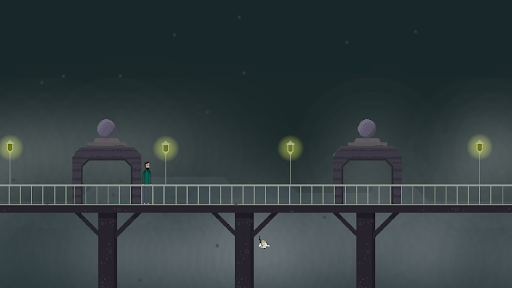
The first screenshots of the prototype — minimum details and only basic mechanics
In case you dream about making a game or already are making one, here’s a useful development trick: plan your resources. Especially if you don’t have much. I had absolutely no skills so I’d chosen to do it in pixel art, moreover back when I started it was trendy. The output is okay and if you are not a skillful artist I would recommend that you start with the easiest art style and make it your own by coming up with a few unique features for your game. The best examples of this approach are: The Beginner's Guide, Slander and SCP (legendary games made out of almost nothing). The rule “less means better” is virtually fail-safe. When you have very limited resources you have to be creative as it helps your project stand out. Ironically, limits help makers finish projects, while also maintaining emotional balance and preventing from going minus on production costs.
The concept of the prototype was simple: every day, the main character comes to the bridge that is a suicide hotspot, then he tries to deter people from jumping.
The process of "deterring" looks like this:
Mini-tip: never underestimate the power of color. If you can find a suitable color scheme, even the most minimalistic game will look SOLID. Here is the article, and you can just use ready-made palettes. The general knowledge about colors will help you in almost everything (you can make a beautiful card to your mother so that she does not drive you out of your home for a longer time ― I can prove it)
The Message, the main character and the name of the game
When I thought about what emotions people should feel from my game, I also realized that I needed a real emotional experience. The focus of everything ― the focus of attention ― was suicide. As it is. And nothing distracting.
The image of the Golden Gate bridge (popular among suicides) immediately came to mind. I didn't want to reference it directly, instead, I wanted to use an aggregated image. It was decided to make a no-name bridge in an average city in the States. I found this info by accident, but many countries have such bridges.
Then you had to come up with a character that would fit into the basic mechanics (to come to this bridge and save suicidal people). I focused on making sure that his motivation was not too personal, that is, that the motivation of the main character was logical enough to justify his presence on the bridge, but at the same time a little blurry, so that there were no conflicts during the game.
As a result, I got a character who did not find himself in life. One day he freaked out from the monotony of life, sent everything to hell, and ended up on the bridge where he saves his first person. Since then, he started visiting the bridge every day and now lives thanks to people’s handouts. Mostly, its gratitude from the families of the rescued, but sometimes people offer him money to fall behind and not interfere with them in deciding what to do with their lives.
Meanwhile, the game title was born - Wait! Life is Beautiful!
Why 'Wait! Life is Beautiful!?
First of all, I immediately imagined what it would look like in the store. To make the name stand out and catch your attention just a little bit. It hooks you emotionally.
Secondly, I am a fan of minimalism and functionalism, so " Wait! Life is beautiful! " — not only the name but also the phrase that begins each dialogue. It's also ironic, because, in fact, this is the most popular, but also the most incorrect phrase that can be said to someone in an unstable emotional state. This is a part of the main message of the game as a whole.
So we have smoothly come to what we are all here for: THE MESSAGE.
I wanted to do something provocative, but not immoral. In addition, I have formed an opinion about games as media, that is that the most important feature and the nature of games are to allow the player to find meaning on their own. Often it is not the one that you want or thinks to be present, but some kind of meaning is always going to be found. The best thing a developer can do is to create a playground and give a theme for the player so that they can do everything without your further participation. It was important for me not to yell about some meaning and not to push my own views, at least in the mechanics (in the game you will not be punished for not saving lives).
Videogames as media ― why make them? If you suddenly want to say something or show something, games are the most accessible and optimal media. Only Twitter is easier than that, by the way, subscribe here. At the same time, games are also super flexible media.
Here I would name This War of Mine as a counter-example. Although the game turned out to be worthy, and it won the hearts of many players, my experience with it was very monotonous. Yes, this was the idea • to show the horrors of war. But when everything screams the same idea, and every choice is built on Escobar's axiom (it’s a Russian meme that means: “when all options are shit”), what ideas should I supplement, ponder about or understand? War is bad. Period.
Let’s talk about the suicides themselves. The theme, of course, is not for everyone, but it should be for everyone. The public taboo on this topic provokes artificial isolation of those affected by this phenomenon. What to do when someone close to you is thinking about suicide or has already decided to end their life? This is not something you discuss with your friends at a bar over a beer. What if you start having destructive thoughts? What will you do? Most likely, you will withdraw into yourself and be silent. But even if you dare to speak up, will people listen to you? You can easily find a bunch of stories about how people openly declare that they can no longer endure life, and they are not taken seriously. This is the result of just one problem: the excessive taboo of the topic, which gives rise to an acquired fear of the unknown and the lack of social experience/pattern of behavior in such situations.
Difficulties with ease
At first, it seems that everything is very simple. Well, that person is going through a rough patch right now. Say good things and they'll get better; say bad things and they'll get worse. That’s it. According to this scheme, the dialogues would look not only monotonous but also super boring. There would be absolutely no effect. So how do I solve this? I decided that I should add a few variables to the equation: first, the people on the bridge are obviously nervous and most likely unstable, so you need to talk to them more on the principle of "do no harm". I also added a few non-obvious outcomes, so that the player does not relax in the dialogues. Some absurd dialogue choices can lead to salvation and some to death. Most cases will have to be thought through separately. Second, guess conclusions won’t work.
As a small feature, I added the option to choose to just move away and not save a person if you do not want to.
Here is a small game designer digression:
I love the keyboard as an interface for interacting with the game (I even made a whole game just about it). Of course, in shooters, you do not reassign the buttons. The experience of playing shooters is propagated from generation to generation through DNA, and fingers instinctively lay on WASD.
But when there’s something interesting with the buttons to do, I do it. There is an option in which you just allow the suicide to jump, without entering into a dialogue. To do it, you use the "DELETE" button (it was intentional, if you know what I mean).
As for the gameplay in general, I wanted to make it casual enough that running the game doesn't seem like doing some work, essentially the game shouldn’t require huge mental investments. You may have noticed the effect that you don't want to launch The Witcher, because you feel that you need to collect your thoughts and play hard for an hour or two. By the way, this is why we see the rise of session media (as an example, games of the match-3 genre and popular TV series). In a short session, the brain has time to adapt to the rules, whether it is the game mechanics, the specifics of the characters or an intriguing beginning of a new episode of the series, less effort is required. After all, we live in the era of ADHD being a norm, so every extra effort and every extra minute that you force your brain to do something that it does not like (except for simple Skinner boxes) naturally causes rejection and a feeling of fatigue. That's why our brain loves conditionally infinite content (in the case of competitive games) or just very long content, like a TV series, because it requires little effort for a win-win strategy.
I tried to solve this problem as best I could. The gameplay starts immediately from the very beginning and requires minimal effort. The only thing is that there is quite a lot of text, but I tried to break it up in the format of a messenger chat (1-2 sentences at most). I did everything I could to make the gameplay go smoothly and I hope it worked.
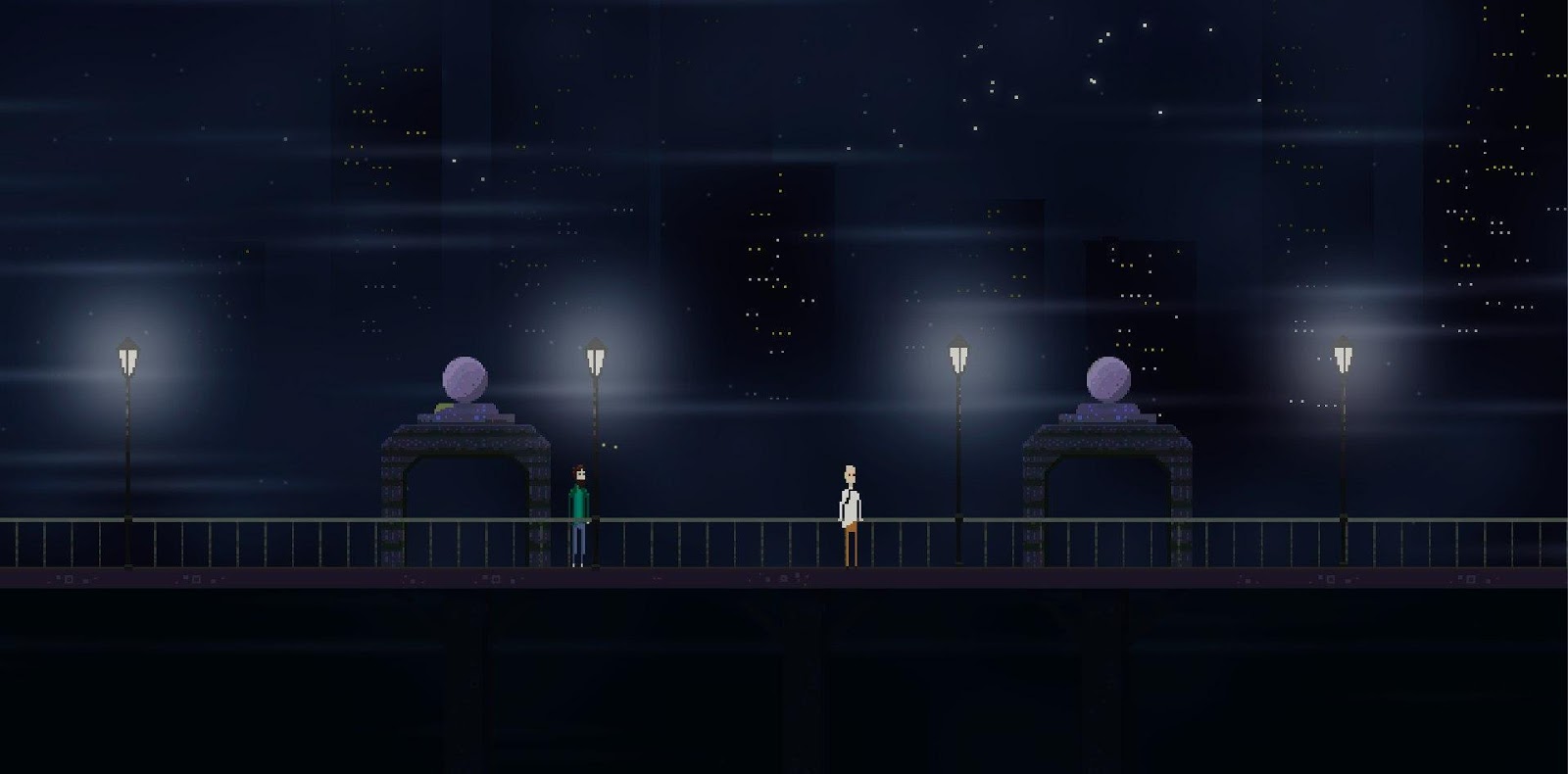
One of the first polished background scenes
The first creativity crisis
So far, the only place where I'd shown my game was a themed game dev bar. That was an event where you could show your game and observe others. We were even given a monitor in a small hall! We split up with friends, I showed the game to those who were in that hall with the screen, pulling people one by one while my friend was showing it on the big screen. There was no negativity and people more or less liked my project. I felt elated, watching how people experienced different emotions when they failed to save their first suicide. In the end, everyone was interested and pleased, we drank rum cola, I defeated some personal complexes and overall, it was a very useful experience.
And then... the crisis hit. Creativity crisis. From programming and drawing, I came to writing dialogues. I honestly thought it would be easy. I mean, you just sit down and start writing it, what's the difficulty? It must be no harder than speaking, right?
So, about mistakes that could have been avoided. I really didn’t foresee the hardship of writing and, as a result, I spent too much time and effort on it. I almost abandoned the project at that point. To sit down and write a few more lines seemed like agony. At the same time, at the end of each day, you look at everything that was written with blood and sweat, and it turns out to be complete nonsense.
For dialogues, I searched through an awful lot of content on the topic. Suicide line memos, real people's stories, news reports, articles, etc., etc. I tried to reproduce this in dialogues as realistically as possible. That said, I do not claim to have the dialogues in the game of absolute similarity to the reality of life. I urge you not to consider the game as a guide for communicating with people in difficult situations.
I had to come up with a lot of little stories and then come up with development for them. I followed this format so that I didn't have to strain myself by studying the whole life story of the person who came to the bridge. (I don’t want the players to fall asleep). Therefore, I wrote in a limited and concise form, varying it a little for every character. The biggest difficulty was to make the main character's responses and reactions different. As a result, writing turned into a torment and I was overtaken by procrastination... And at some point, I actually abandoned the game which was almost completely finished. Obviously, I needed a distraction, so I made a small game project.
Publisher
After the release of the first game(which was supposed to be the second) and ONE positive review, I got a second breath. How little was required, huh?
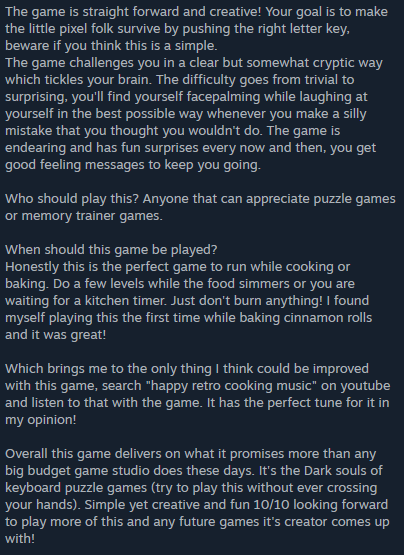
At the same time, I found the strength to continue the development of “Wait! Life is Beautiful!”. I polishedit a little here and there, updated the release date, and made a little cover art...
Then, suddenly I got contacted by a publisher. Btw, my publisher is a Russian company GameNet. They just recently started publishing indies and W!LiB is one of the first games in their roster. It's funny that initially, the publisher didn't know that I was from Russia and we agreed on the first details in English.
To be honest, Russian game dev causes very mixed emotions, although it can most likely be called successful. You probably think that we are in the deepest decline, although this is absolutely not true: every year a lot of quite popular games are born (especially in the world of post-indie Apocalypse) Black Book collected 143k dollars ― even with the deduction of the Kickstarter share, this is more than an impressive budget for an indie. Not to mention Stoneshard, and one of my favorites – Jet Lancer and Please, Don't Touch Anything. These are all products of very, very high quality.
Make Russian gamedev great again!But many things are also quite bad. Here, as they say, there is always the other side of the coin.
The first is the money-choking mobile industry, where, on the one hand, there are a lot of successful studios, but on the other hand, how many developers already have a nervous tick from the MATCH-3 genre?
On the other hand, we have several large studios, but, mostly, they are engaged in outsourcing or mobile games (probably with the exception of the recently arrived LARIAN with an office in Saint-Petersburg and World of Tanks). Why we don't have our own AAA projects is hard to say. It is clear that you can launch another hyper-casual project and close the mortgage on your second palace in a day, but I think a strong sensational AAA would help the prestige of the entire game development industry in Russia.
Of course, without the language barrier, the cooperation is quite brisk. It is too early to draw conclusions, but, in general, we do not have any negative moments yet. The team I work with is even more excited about the game than I am, which, of course, warms my heart. There is only one point: the game is still considered risky because of the theme, it is difficult to uniquely determine its genre. It is also not easy to find relevant competitors for analysis. Which, of course, is great for me as a game designer, but it can negatively affect sales.
In any case, with the publisher, the game has a thousand times more opportunities to find its place in the wild world of indie games.
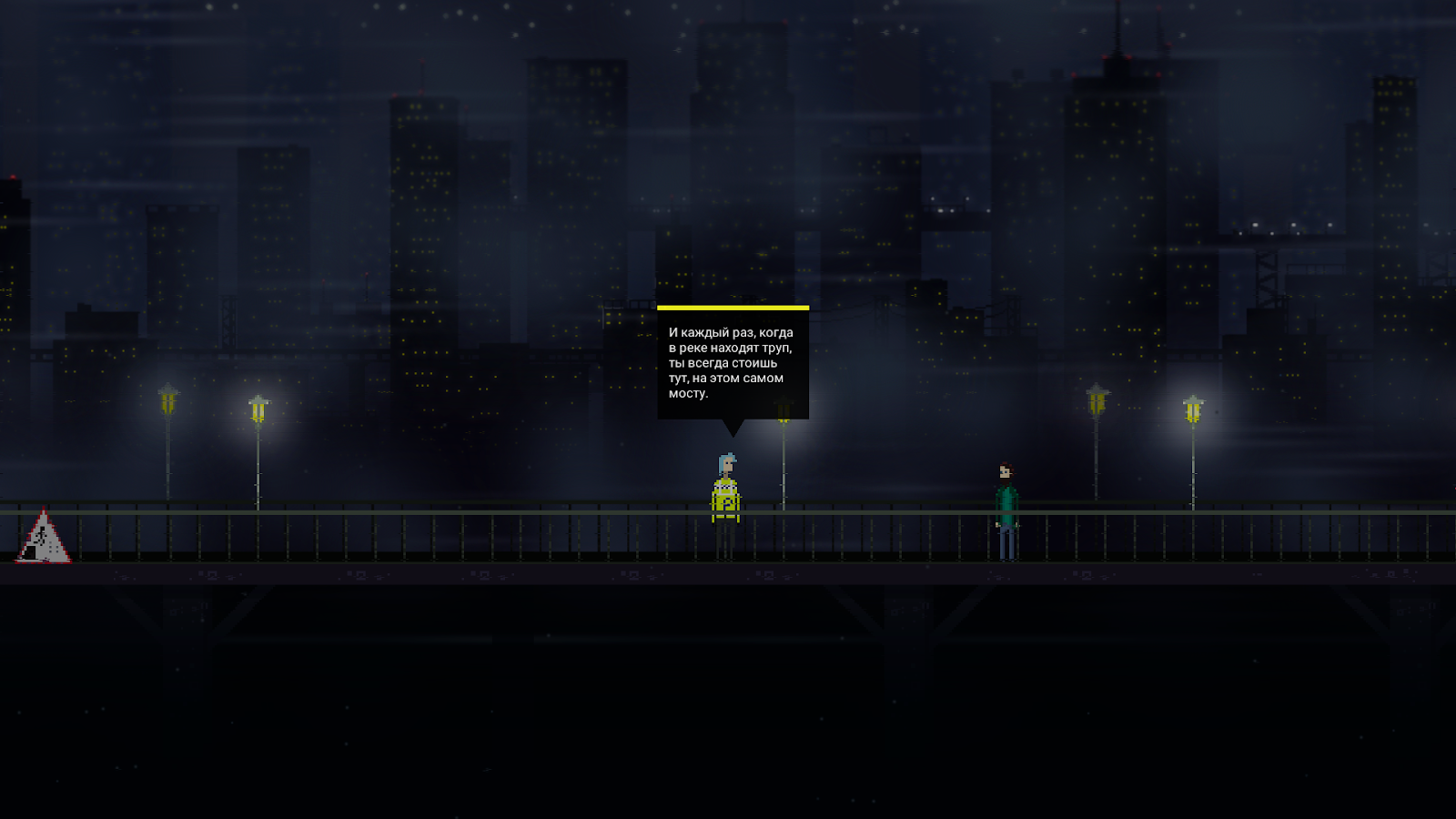
Now we are finally on the finishing line to release and there is very little time left before the game sees the light of day. By the way, it was very nice to find that even before the launch of any activities, several people wrote to me in steam and on Twitter that they were already very much waiting for the release. So far, I think it has turned out to be a strong project, and whether it will find its place in the world is not for me to decide.
There will be a summary of the results after the release, I hope-good results.
Thank you, friends, if you have finished reading it.
Cheers,
Egor Perviy
Read more about:
Featured BlogsAbout the Author(s)
You May Also Like









